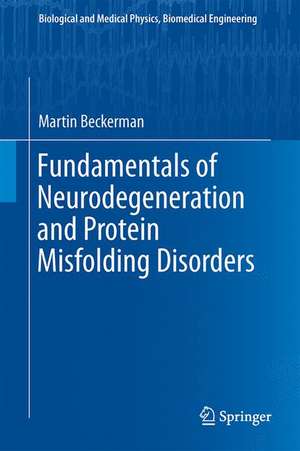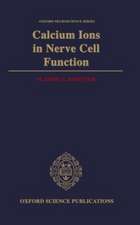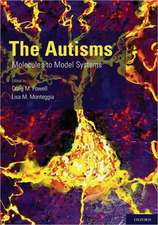Fundamentals of Neurodegeneration and Protein Misfolding Disorders: Biological and Medical Physics, Biomedical Engineering
Autor Martin Beckermanen Limba Engleză Hardback – 18 noi 2015
Authoritative but written in a clear and engaging style, Fundamentals of Neurodegeneration and Protein Misfolding Disorders addresses one of today’s forefront areas of science and medicine. The text emphasizes the new groundbreaking biophysical and biochemical methods that enable molecular-level explorations and the conceptual breakthroughs that result. It contains separate chapters on each of the major disease classes. Special emphasis is placed on those factors and themes that are common to the diseases, especially failures in synaptic transmission, mitochondrial control, and axonal transport; breakdowns in RNA processing; the potential role of environmental factors; and the confounding effects of neuroinflammation. The book is ideal for use in teaching at the advanced undergraduate and graduate levels, and serves as a comprehensive reference for a broad audience of students and researchers in neuroscience, molecular biology, biological physics and biomedical engineering.
| Toate formatele și edițiile | Preț | Express |
|---|---|---|
| Paperback (1) | 840.64 lei 6-8 săpt. | |
| Springer International Publishing – 23 aug 2016 | 840.64 lei 6-8 săpt. | |
| Hardback (1) | 651.84 lei 6-8 săpt. | |
| Springer International Publishing – 18 noi 2015 | 651.84 lei 6-8 săpt. |
Din seria Biological and Medical Physics, Biomedical Engineering
- 5%
 Preț: 1110.32 lei
Preț: 1110.32 lei - 18%
 Preț: 1006.55 lei
Preț: 1006.55 lei - 18%
 Preț: 960.78 lei
Preț: 960.78 lei - 18%
 Preț: 704.10 lei
Preț: 704.10 lei - 18%
 Preț: 967.40 lei
Preț: 967.40 lei - 18%
 Preț: 948.92 lei
Preț: 948.92 lei - 15%
 Preț: 641.71 lei
Preț: 641.71 lei - 15%
 Preț: 644.95 lei
Preț: 644.95 lei - 15%
 Preț: 665.08 lei
Preț: 665.08 lei - 18%
 Preț: 1669.16 lei
Preț: 1669.16 lei - 18%
 Preț: 941.05 lei
Preț: 941.05 lei - 18%
 Preț: 956.81 lei
Preț: 956.81 lei - 18%
 Preț: 950.21 lei
Preț: 950.21 lei - 15%
 Preț: 636.80 lei
Preț: 636.80 lei - 18%
 Preț: 947.50 lei
Preț: 947.50 lei - 15%
 Preț: 636.80 lei
Preț: 636.80 lei -
 Preț: 397.01 lei
Preț: 397.01 lei - 18%
 Preț: 1236.99 lei
Preț: 1236.99 lei - 15%
 Preț: 644.49 lei
Preț: 644.49 lei - 18%
 Preț: 946.55 lei
Preț: 946.55 lei - 15%
 Preț: 712.22 lei
Preț: 712.22 lei - 18%
 Preț: 952.89 lei
Preț: 952.89 lei - 18%
 Preț: 944.36 lei
Preț: 944.36 lei - 18%
 Preț: 1228.29 lei
Preț: 1228.29 lei - 5%
 Preț: 1422.67 lei
Preț: 1422.67 lei - 18%
 Preț: 1393.27 lei
Preț: 1393.27 lei - 15%
 Preț: 651.19 lei
Preț: 651.19 lei - 18%
 Preț: 953.65 lei
Preț: 953.65 lei - 18%
 Preț: 955.88 lei
Preț: 955.88 lei - 15%
 Preț: 644.95 lei
Preț: 644.95 lei - 5%
 Preț: 1098.48 lei
Preț: 1098.48 lei - 18%
 Preț: 959.19 lei
Preț: 959.19 lei - 15%
 Preț: 643.65 lei
Preț: 643.65 lei - 5%
 Preț: 1165.40 lei
Preț: 1165.40 lei - 5%
 Preț: 1102.67 lei
Preț: 1102.67 lei - 18%
 Preț: 952.09 lei
Preț: 952.09 lei - 18%
 Preț: 946.55 lei
Preț: 946.55 lei - 18%
 Preț: 952.09 lei
Preț: 952.09 lei - 15%
 Preț: 703.20 lei
Preț: 703.20 lei - 18%
 Preț: 953.65 lei
Preț: 953.65 lei - 5%
 Preț: 1008.41 lei
Preț: 1008.41 lei - 15%
 Preț: 644.82 lei
Preț: 644.82 lei - 18%
 Preț: 956.03 lei
Preț: 956.03 lei - 15%
 Preț: 647.40 lei
Preț: 647.40 lei
Preț: 651.84 lei
Preț vechi: 766.87 lei
-15% Nou
Puncte Express: 978
Preț estimativ în valută:
124.76€ • 129.74$ • 104.40£
124.76€ • 129.74$ • 104.40£
Carte tipărită la comandă
Livrare economică 15-29 martie
Preluare comenzi: 021 569.72.76
Specificații
ISBN-13: 9783319221168
ISBN-10: 3319221167
Pagini: 350
Ilustrații: XXII, 378 p.
Dimensiuni: 155 x 235 x 27 mm
Greutate: 0.74 kg
Ediția:1st ed. 2015
Editura: Springer International Publishing
Colecția Springer
Seria Biological and Medical Physics, Biomedical Engineering
Locul publicării:Cham, Switzerland
ISBN-10: 3319221167
Pagini: 350
Ilustrații: XXII, 378 p.
Dimensiuni: 155 x 235 x 27 mm
Greutate: 0.74 kg
Ediția:1st ed. 2015
Editura: Springer International Publishing
Colecția Springer
Seria Biological and Medical Physics, Biomedical Engineering
Locul publicării:Cham, Switzerland
Public țintă
GraduateCuprins
Introduction.- Protein Folding, Part I: Basic Principles.- Protein Folding, Part II: Energy Landscapes and Protein Dynamics.- Protein Misfolding and Aggregation.- Protein Quality Control, Part I: Molecular Chaperones and the Ubiquitin-Proteasome System.- Protein Quality Control, Part II: Autophagy and Aging.- Prion Diseases.- Alzheimer’s Disease.- Parkinson’s Disease.- Huntington’s Disease and other Unstable Repeat Disorders.- Amyotrophic Lateral Sclerosis and Frontotemporal Lobar Degeneration.
Recenzii
“This text concerns protein conformational aberrations and expression in the following diseases: Alzheimer’s, Parkinson’s, Huntington’s, amyotrophic lateral sclerosis, etc. … The book is primarily for physical chemists and researchers having an interest in the molecular mechanisms of neurological diseases.” (Joseph J. Grenier, Amazon.com, March, 2016)
Notă biografică
Dr. Beckerman has held teaching and research positions at the Weizmann Institute of Science, University of Rochester, Massachusetts Institute of Technology, University of Tennessee, Oak Ridge National Laboratory and most recently as senior scientist in the Y-12 National Security Complex. He has broad experience in nuclear physics, self-organizing processes, complex dynamical systems science and biophysics. In his early work in nuclear physics, he carried out sub-barrier fusion measurements and developed statistical models for analysis of heavy-ion induced sub-barrier fusion and fission reactions. He has over 100 publications and has written two monographs on the subject. His subsequent work on self-organization and complex systems led to publication of the statistical-mechanics-based tome Adaptive Cooperative Systems (1997, Wiley). His more recent research interests resulted in publication of the basic textbook Molecular and Cellular Signaling (2005, Springer), the more-advanced tract Cellular Signaling in Health and Disease (2009, Springer) and, most recently, to the present textbook. He recently retired from Y-12 and has continued his research activities as a consultant and as an educator.
Textul de pe ultima copertă
This unique text introduces students and researchers to the world of misfolded proteins, toxic oligomers, and amyloid assemblages, and the diseases of the brain that result. During the past few years the connections between failures in protein quality control and neurological disorders have been reinforced and strengthened by discoveries on multiple fronts. These findings provide novel insights on how amyloidogenic oligomers and fibrils form, interconvert from one state to another, and propagate from cell to cell and region to region. Starting with protein folding and protein quality control basics, the reader will learn how misfolded proteins can cause diseases ranging from prion diseases to Alzheimer’s disease and Parkinson’s disease to Huntington’s disease, amyotrophic lateral sclerosis and frontotemporal lobar degeneration.
Authoritative but written in a clear and engaging style, Fundamentals of Neurodegeneration and Protein Misfolding Disorders addresses one of today’s forefront areas of science and medicine. The text emphasizes the new groundbreaking biophysical and biochemical methods that enable molecular-level explorations and the conceptual breakthroughs that result. It contains separate chapters on each of the major disease classes. Special emphasis is placed on those factors and themes that are common to the diseases, especially failures in synaptic transmission, mitochondrial control, and axonal transport; breakdowns in RNA processing; the potential role of environmental factors; and the confounding effects of neuroinflammation. The book is ideal for use in teaching at the advanced undergraduate and graduate levels, and serves as a comprehensive reference for a broad audience of students and researchers in neuroscience, molecular biology, biological physics and biomedical engineering.
Authoritative but written in a clear and engaging style, Fundamentals of Neurodegeneration and Protein Misfolding Disorders addresses one of today’s forefront areas of science and medicine. The text emphasizes the new groundbreaking biophysical and biochemical methods that enable molecular-level explorations and the conceptual breakthroughs that result. It contains separate chapters on each of the major disease classes. Special emphasis is placed on those factors and themes that are common to the diseases, especially failures in synaptic transmission, mitochondrial control, and axonal transport; breakdowns in RNA processing; the potential role of environmental factors; and the confounding effects of neuroinflammation. The book is ideal for use in teaching at the advanced undergraduate and graduate levels, and serves as a comprehensive reference for a broad audience of students and researchers in neuroscience, molecular biology, biological physics and biomedical engineering.
Caracteristici
Presents a systematic, textbook-quality treatment of protein misfolding and its central role in neurodegeneration Provides a foundation for understanding the multiple causes and progression of familial and sporadic forms of neurodegenerative diseases Contains chapters on each of the major disease classes Emphasizes the pioneering experimental and computational methods that enable molecular-level explorations and the conceptual breakthroughs they produce Describes up-to-date theories on the mechanisms underlying amyloid and toxic-oligomer-driven synaptic impairment, neuronal failure, and death Includes summaries of the main points of each chapter, numerous figures, and key references
















